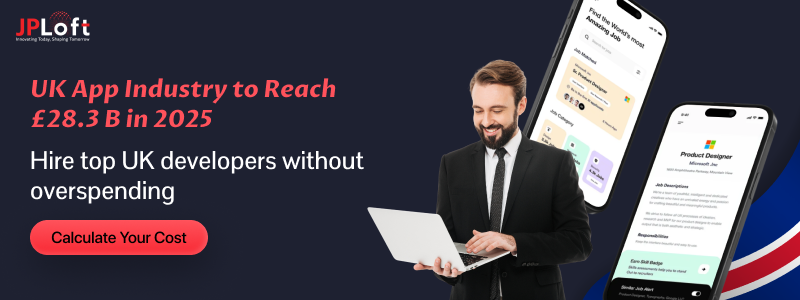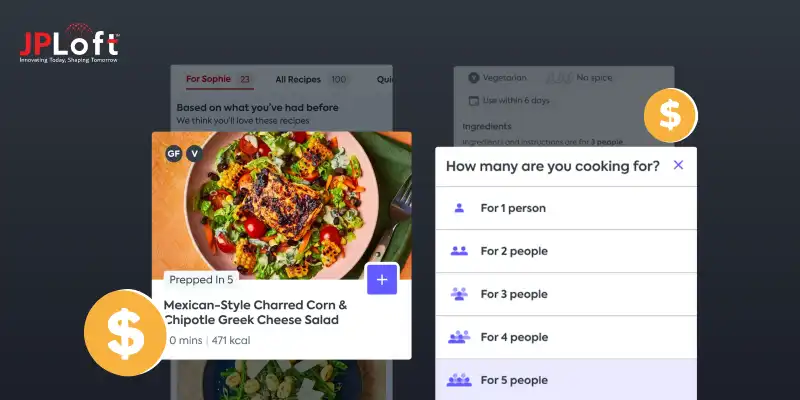Key Takeaways:
The cost to hire a mobile app developer in the UK typically ranges from £40 to £150 per hour, influenced by experience, skillset, and project complexity.
UK developers deliver high standards of compliance, security, and design, ensuring apps are scalable, user-friendly, and aligned with industry regulations.
Advanced technologies like AR/VR, blockchain, and IoT can raise costs but provide future-ready apps that drive better engagement and long-term ROI.
Entrepreneurs gain cost transparency and access to top-tier talent in the UK, enabling smarter budgeting and efficient project planning.
Investors benefit from UK developers’ expertise in building high-quality, secure, and scalable apps, ensuring strong adoption and reliable market performance.
JPLoft helps businesses cut unnecessary costs and build robust apps with tailored solutions, industry know-how, and proven success across global markets.
Do you know that users worldwide spent 4.2 trillion hours in apps? which represents that apps dominate the daily lives of the majority of users.
This creates an opportunity to invest in this vast mobile app market. In today’s digital-first economy, that investment often takes the shape of building a mobile app. But before diving in, one question stands out: How much does it cost to hire a mobile app developer in the UK? The short answer is between £40–£150 ($42–$159) per developer.
This blog is designed to give entrepreneurs and investors a clear picture of what influences that range. From experience levels and project complexity to hidden costs and advanced technologies, we’ll break down the real factors that drive pricing. For entrepreneurs, this helps in budgeting and finding the right balance between cost and quality.
For investors, it offers insights into ROI and long-term scalability. By the end of this guide, you’ll know how to assess developers wisely, manage your budget effectively, and ensure your app project delivers maximum value.
Let’s learn it all together.
Why Hire a Mobile App Developer in the UK?
Hiring a mobile app developer in the UK gives you access to world-class talent, strict quality standards, and innovative design practices.
UK developers are known for balancing creativity with technical precision, ensuring your app is both user-friendly and scalable.
If you start an online mobile business, it becomes significant to look for a talented group of experts who can convert your dream app idea into success.
Let’s evaluate the complete reasons to hire a mobile app developer below.
1. Growing Market for Mobile Apps
In 2024, 137.8 billion apps and games were downloaded worldwide (91.3 billion non-game apps, 46.9 billion games)
This growing market for mobile apps opens an opportunity for investors to launch their own apps and convert the idea into reality.
2. Availability of Talented Pool
There is a very talented pool of developers in the UK with knowledge of native (iOS/Android), cross-platform, and leading-edge technologies.
By hiring locally, you gain access to developers who are familiar with global best practices and stay current with the latest frameworks.
In this competitive world, it is important to evaluate the talent pool and explore the right developer who can convert your dream app into success.
3. Firm Emphasis on Quality and Compliance
UK mobile app developers are recognized for following rigorous quality measures, GDPR compliance, and accessibility regulations.
Your app will not only run effectively, but will also conform to regulatory compliance, highly necessary for industries such as finance, healthcare, and education.
A firm that emphasizes the quality and compliance of a project integrates robust quality. If you are the one looking for quality and compliance, then hiring a mobile app developer in the UK is one of the important parameters to look forward.
4. Improved Communication and Coordination
Collaborating with UK-based developers removes significant language and time zone issues.
This results in smoother communication, quicker feedback loops, and less miscommunication, assisting projects in getting from idea to release more effectively.
If you belong to the UK, then hiring UK-based developers can be a plus point for your business.
5. Access to Forward-Thinking Markets
The UK is a fintech, retail, healthcare, and on-demand app hub. Here, developers have experience developing apps for these sectors, which means your business can benefit from domain expertise and knowledge of what works in competitive markets.
When you hire mobile app developers in the UK, you will have a wide pool of developers with whom you can connect and lead the market.
6. Long-Term Partnerships That Can Be Trusted
UK developers tend to prefer creating long-term relationships over standalone projects.
They offer post-launch support, updates, and scalability planning, essentials for business owners and investors to future-proof their mobile applications.
When you connect with the vast pool of experts, it all results in building trust among the users.
7. Competitive ROI for Investors
Whereas in the UK, recruitment can be more expensive compared to offshore solutions, there is a greater return on investment through better quality, security, and scalability.
Investors have an assurance that investing in apps developed in the UK is less risky and has higher adoption levels.
When it comes to investments, ROI comes at the top. Here, you need to identify whether the hiring of developers can help you earn a high rate of revenue or not.
Now, after considering the above reasons, let’s evaluate the given section for more.
Points to Consider While Hiring a Mobile App Developer in the UK
There is a vast scale to consider while hiring a mobile app developer, such as the scope of the project, the budget, and the technical expertise. Along with the communication skills and cultural fit.
Let’s learn all the points while hiring a mobile app developer in the UK.
1] Clearly Define Your App Requirements
Initial hiring should have your app's purpose, main features, audience, and platform preference (iOS, Android, or cross-platform) clearly outlined.
Clarity guides you to select the right developer who matches your expertise. Without requirements, it is easier to incur cost overruns and delays.
2] Verify Experience and Technical Expertise
Check the developer's previous work, particularly in sectors such as fintech, e-commerce, or on-demand services, where the UK market is prominent.
Check for experience in tools such as React Native, Flutter, or native development. The proper expertise ensures that your app will be scalable and future-proof.
3] Assess Communication and Collaboration Skills
Smooth collaboration is essential for success. Ensure the developer is responsive, proactive, and comfortable with regular updates or agile workflows. UK-based developers often excel in communication, but testing this early saves headaches later.
4] Consider Compliance and Data Security Knowledge
UK companies are required to follow GDPR and data protection regulations. Ensure that the developer understands secure coding practices, user privacy, and compliance during hiring. Emphasis on these aspects instills investor trust and reduces regulatory threats.
5] Compare Hiring Models and Costs
Determine if you require a freelancer, an in-house developer, or a full-service app development firm. Each model has varying costs and commitments. Although freelancers can appear to be cost-effective, agencies or specialized developers usually offer superior long-term value and post-launch support.
6] Consider Post-Launch Support and Maintenance
Constructing the app is just the start. Ask if the developer provides regular updates, bug fixes, and scalability planning. Regular support and reliable mobile app maintenance services keep your app competitive and easy to use as technology and user expectations continue to change.
Well, one of the crucial aspects while hiring a mobile app developer is cost. Hence, let's evaluate the cost to hire mobile app developers in the United Kingdom in the following section.
Understanding the Cost to Hire a Mobile App Developer in the UK
The overall cost to hire a mobile app developer in the UK ranges from £40 to £150 per developer. However, several factors influence this cost.
These prices are different based on level of experience, complexity of the project, and what kind of expertise you require. In the UK, additional aspects like compliance, security, and user experience standards are considered in developer pricing, affecting costs.
Although freelance developers might look inexpensive, agencies have organized workflows and quality control that make their higher prices worthwhile. Knowing the ranges to estimate the mobile app development cost ahead of time allows companies to budget efficiently and choose the ideal candidate for sustained success.
|
Factor |
Cost Range / Impact |
Notes |
|
Hourly Rate |
£40 – £150 per developer |
Varies by skill, experience, and project needs |
|
Experience Level |
Junior (£40–£60), Mid (£70–£100), Senior (£120–£150) |
Higher experience means faster, more reliable delivery |
|
Project Complexity |
+20–50% on base rates |
Advanced features, integrations, or enterprise-grade apps |
|
Expertise / Specialization |
£100+ per hour for AI, AR/VR, blockchain, fintech |
Niche skillsets cost significantly more |
|
Freelancer |
£40 – £90 |
Lower upfront cost, less structured process |
|
Agency |
£80 – £150+ |
Higher cost but includes workflows, QA, and team support |
|
Compliance & Security |
+15–30% extra |
GDPR, financial, or healthcare compliance raises costs |
|
UI/UX Standards |
+20–25% extra |
High-quality design, animations, and interactive flows |
After evaluating these costs, let’s move forward with the factors impacting the developer hiring costs in the given section.
Factors That Influence Developer Hiring Costs
When you think of converting the mobile app idea into a success, cost and managing the budget come hand-in-hand.
Additionally, hiring the developers is one of the important aspects in defining the estimated costs. Evaluating the complete cost to hire mobile app developers in the UK can not be successful without learning the diverse factors.
Let’s learn the following lists of factors in detail.
1. Level of Experience
The most apparent pricing factor is experience. UK junior developers tend to price between £40–£60 per hour, providing value for money but needing more supervision.
Mid-level developers with 3–5 years' experience strike a balance between price and dependability, with £70–£100 per hour.
Senior developers aged 7–10+ can charge €120–€150+ due to their advanced skills. They provide efficiency, architectural skills, and lower error rates that save in the long run. Costing more for experienced developers typically avoids expensive rework down the line.
Let’s check out the given table stating the level of experience and its impact on the cost.
|
Expertise Level |
Hourly Rate (£) |
Key Highlights |
|
Junior Developer |
£40 – £60 |
Affordable option, good for basic tasks, but requires more supervision and guidance. |
|
Mid-Level Developer |
£70 – £100 |
Balanced choice with 3–5 years’ experience, reliable delivery, and moderate cost. |
|
Senior Developer |
£120 – £150+ |
Highly skilled with 7–10+ years’ experience, offers efficiency, architectural expertise, and fewer errors—saves long-term costs. |
2. Skillset and Specialization
When you create a mobile app, you will identify that not all developers are the same; general mobile app developers are cheaper than those with expertise in AI, IoT, blockchain, AR/VR, or fintech regulation.
Such specialized fields require constant learning and profound technical expertise, so such talent is scarce and pricey.
For instance, an expert developer with proficiency in AI-powered personalization or crypto payments integration may quote 20–40% more than a regular app developer.
Specialized skills guarantee quicker issue resolution, enhanced security, and advanced features that differentiate your app in a competitive marketplace.
Let’s check out the table below, stating how the skillset and specialization impact the total cost to hire a mobile app developer in the UK.
|
Specialization Area |
Hourly Rate (£) |
Impact on Cost |
|
General Mobile App Development |
£40 – £80 |
Standard rates for typical iOS/Android apps with basic features. |
|
UI/UX-Focused Developer |
£70 – £100 |
Higher costs due to expertise in design-driven development, animations, and user-centric flows. |
|
AI / Machine Learning |
£100 – £150+ |
Premium rates for advanced personalization, predictive analytics, and AI-powered features. |
|
Blockchain Development |
£110 – £150+ |
Increased costs for smart contracts, crypto payments, and secure ledger integrations. |
|
AR/VR Development |
£100 – £140+ |
Specialized skills for immersive experiences raise overall hiring costs. |
|
Fintech / Compliance-Focused Developer |
£120 – £150+ |
Extra charges for handling secure transactions, GDPR, and financial compliance requirements. |
3. Platform Selection (iOS, Android, or Cross-Platform)
Developing for iOS, Android, or both greatly influences the cost of hiring. Native iOS developers tend to be slightly more expensive because Apple's guidelines are stricter, and the tools they require, such as Swift or Objective-C, are specialized.
Android development, too, will differ, particularly when optimizing for the massive selection of devices.
Cross-platform tools such as Flutter and React Native cut overall timelines and budgets, but actual experts in them tend to charge a premium.
Companies have to balance upfront hiring expenses against long-term gains in updates and maintenance.
Let’s discuss the given table, stating the role of platform selection in evaluating the cost to employ a mobile app developer in the UK.
|
Platform |
Pricing Factor (£ per hour) |
Impact on Overall Cost |
|
iOS (Swift/Objective-C) |
£70 – £120 |
Slightly higher due to Apple’s strict guidelines, advanced tools, and design requirements. |
|
Android (Java/Kotlin) |
£60 – £110 |
Broader device range adds testing costs, though base rates are slightly lower than iOS. |
|
Cross-Platform (Flutter/React Native) |
£80 – £130 |
Higher hourly rate, but reduces overall project cost by covering both iOS and Android with a single codebase. |
4. Project Complexity
A straightforward app with login functionality and static pages will cost much less than a social networking or financial app with real-time functionalities.
Complexity increases as the number of mobile app features, third-party APIs, backend connectivity, or scalability increases. Apps with real-time chat, AR modules, advanced analytics, or IoT integration can increase costs several times.
Developers will cost more for these due to the extra effort of testing, debugging, and security verification. Complexity not only drives up hourly rates but also project time.
Let’s discuss the factor of project complexity and its impact on the costs, in the given table.
|
Project Complexity |
Estimated Cost |
How It Affects Overall Cost |
|
Basic App (simple features, static pages) |
£40 – £70 |
Lower complexity means shorter timelines, fewer integrations, and reduced supervision. |
|
Moderate App (APIs, user accounts, payments) |
£70 – £110 |
Additional features and integrations increase coding, testing, and design work, raising costs. |
|
High-Complexity App (real-time chat, AR/VR, AI, IoT) |
£110 – £150+ |
Demands senior-level developers, advanced security, scalability planning, and longer timelines, resulting in the highest costs. |
5. App Design and UI/UX Requirements
User interface and experience design are essential in today's apps. Apps that require intuitive usability, clean looks, interactive animations, or micro-interactions need experienced developers or UI/UX design services that can blend design and functionality.
Such developers or teams might charge 20–30% more. High-quality UI/UX can be the difference between an app that's abandoned after a single use and one that acquires dedicated daily users.
Companies tend to overestimate the price of good design, but it has a direct impact on conversions, retention, and ROI.
Here, the mobile app design can be impacted by complexity, which covers diversified factors such as animations, features, and custom interfaces.
Let’s learn how the design impacts the cost to hire a mobile app developer in the United Kingdom in the table below.
|
Design Factor |
Cost estimated (£) |
How It Affects Overall Cost |
|
Basic UI/UX (Standard layouts) |
£40 – £70/hour |
Lower cost; simple interfaces with minimal customization, suitable for MVPs. |
|
Moderate UI/UX (Custom screens, smooth navigation) |
£70 – £110/hour |
Medium cost; requires skilled developers to design engaging and user-friendly flows. |
|
Advanced UI/UX (Animations, interactive elements, premium visuals) |
£110 – £150+/hour |
High cost; adds 20–30% to total budget due to advanced design work and higher retention potential. |
6. Location Within the UK
Prices vary based on the location of the developer. Developers based in London, with greater living costs, charge the most.
Pricing can be 20–30% higher than for areas such as Northern England or Wales. For companies, location impacts both cost and availability for face-to-face meetings and cultural fit.
Off-site developers from lower-cost areas of the UK can deliver the same level of technical quality at reduced prices, which is why most companies seek outside London when they hire.
Let’s evaluate the given table, stating how the location within the UK impacts the overall cost to hire mobile app developers in the UK.
|
Location |
Hourly Rate (£) |
Impact on Cost |
|
London & Major Cities |
£100 – £150+ |
Highest rates due to higher living expenses, demand, and premium developer availability. |
|
Mid-Sized Cities |
£70 – £110 |
Moderate costs; strong talent pool with slightly lower overheads compared to London. |
|
Smaller Cities & Remote UK Regions |
£40 – £80 |
More affordable; lower living costs and competition keep prices down, but access to top-tier talent may be limited. |
7. Engagement Model (Freelance vs Agency vs In-House)
Freelancers are flexible and have lower initial costs, with billing anywhere from €40–€90 an hour. But they tend to need good client-side management.
Agencies could bill higher (€80–€150 an hour) but deliver organized teams with project managers, QA testers, and UI/UX designers.
Hiring internally is the most costly, as salaries, recruitment, training, and benefits all come into play, but it guarantees focused care and complete control. Many businesses compare this option with mobile app development companies, and the decision ultimately depends on project size, schedule, and budget priorities
Considering the engagement model as a factor is crucial. Hence, let’s evaluate the costs in detail in the table stated below.
|
Engagement Model |
Hourly Cost (£) |
Impact on Overall Cost |
|
Freelance |
£40 – £90 |
Lowest upfront cost, but requires strong project management and may risk delays or inconsistent quality. |
|
Agency |
£80 – £150+ |
Higher rates, but includes structured workflows, QA, design, and project management—reduces risk and ensures quality delivery. |
|
In-House |
£60,000 – £90,000+ annually |
Most expensive long-term option due to salaries, benefits, and training, but offers dedicated focus and control. |
8. Project Timeline and Urgency
If you’re in a rush to launch your app, expect costs to rise. Developers charge higher for expedited delivery since they may need to work overtime or deprioritize other clients.
For instance, compressing a 6-month project into 3 months can increase costs by 30–50%.
Urgency also restricts your ability to select developers; you might need to take on whoever is available at the time, whether their prices exceed your budget or not. Pre-planning saves time and money.
Let’s evaluate the following table, stating how the project timeline and Urgency impact the total cost to hire mobile app developers.
|
Timeline Factor |
Timeline |
Estimated cost (£ per hour) |
Effect on Overall Cost |
|
Standard Timeline |
4–6 months |
£40 – £100 |
Normal project flow, balanced workload, standard pricing. |
|
Tight Deadlines |
2–3 months |
£90 – £130 |
Developers charge extra to prioritize your project, often +20–30% higher. |
|
Urgent Delivery |
Under 2 months |
£120 – £150+ |
Premium rates applied (+30–50%) as overtime, extra resources, and fast-tracking are required. |
9. Post-Launch Maintenance
Most companies incorrectly believe costs stop at launch, but apps need to be updated regularly. Maintenance involves fixing bugs, supporting new versions of the OS, feature improvements, and performance enhancements.
Typically, developers provide monthly or annual maintenance plans, perhaps costing 15–20% of the total project.
Although this might appear to be an additional expense, neglecting maintenance results in stale apps, negative reviews, and user churn. Regular relationships with developers keep your app competitive within the UK market.
Here is the table stating how post-launch maintenance impacts the total cost to hire mobile app developers in the UK.
|
Maintenance Factor |
Cost Estimate (£) |
How It Affects Overall Cost |
|
Bug Fixes & Updates |
+£500 – £2,000 annually |
Ensures app stability and compatibility with OS updates. |
|
Feature Enhancements |
+£1,000 – £5,000+ annually |
Adding new features or improvements increases long-term costs. |
|
Security & Compliance |
+15–20% of project cost |
Extra investment needed to keep the app GDPR-compliant and secure. |
|
Server & Hosting |
£50 – £500 monthly |
Regular backend and cloud costs are recurring. |
|
Performance Optimization |
+10–15% of development fee |
Required to maintain speed and scalability over time. |
10. Security and Compliance Requirements
The UK has its own strict compliance regulations, such as GDPR for data privacy. Fintech, healthcare, or e-commerce apps need to adhere to extra security regulations.
The developers who specialize in secure code practices, penetration testing, and compliance frameworks may be quite expensive. The overall mobile app security implementation and its cost are impacted by the diversified security protocols.
The reason is valid since data breaches can cost businesses millions in reputational loss and fines. All of the features, such as two-factor authentication, biometric login, and an encrypted database, contribute to increased development time and expense but are critical for trust.
Here is the table stating the role of security and compliance in impacting the total costs.
|
Requirement |
Impact on Cost |
Pricing Factor |
|
GDPR Compliance |
Requires strict data privacy rules, encryption, and user consent features. |
+10–15% overall cost |
|
Financial/Payment Security |
PCI DSS compliance, secure payment gateways, and fraud prevention increase workload. |
+15–20% overall cost |
|
Advanced Security Features |
Features like biometric login, two-factor authentication, and encrypted databases require extra coding and testing. |
+10–20% overall cost |
|
Regular Security Audits |
Ongoing testing, penetration checks, and updates to meet standards add to developer time. |
+10–15% overall cost |
11. Tech Stack and Tools Used
The technology used can influence the cost and availability of professional developers. Using Swift for iOS or Kotlin for Android is typical, but if you need sophisticated features enabled by AI (TensorFlow, PyTorch) or blockchain (Solidity), it will cost more.
Yes, the mobile app tech stack is one of the important determinants when you proceed with your dream app. However, you need to evaluate the team of developers who are skilled enough to implement the required technologies and tools in your app.
Licensing costs are also associated with some tools, which are considered by developers while quoting. Experienced developers who are aware of utilizing the latest technology stacks effectively justify their high charges based on performance and scalability advantages.
Here’s a table stating the role of the tech stack in impacting the overall cost and the pricing factor.
|
Tech Stack / Tools |
Impact on Cost |
Pricing Factor (£ per hour) |
|
Standard Native |
Baseline pricing |
£40 – £100 |
|
Cross-Platform |
Higher expertise |
£70 – £120 |
|
AI/ML Frameworks |
Specialized skills |
£100 – £150+ |
|
Blockchain / Web3 |
Niche expertise |
£120 – £160+ |
|
Cloud Integration |
Added licensing |
+15–25% |
|
Third-Party APIs |
Subscription-based |
+10–20% |
12. Project Management and Team Collaboration Tools
Structured development isn’t just about coding; it’s about communication and workflow.
Developers or agencies using Agile, Scrum, or Kanban methodologies may charge higher, but you’ll benefit from faster iterations and better transparency.
Collaboration tools like Jira, Trello, and Slack also increase productivity, but add to operational overhead.
Businesses often find that paying extra for structured project management results in fewer delays, less miscommunication, and smoother delivery of milestones.
Let’s discuss the role of project management and team collaboration tools and their impact on the total cost to hire a mobile app developer in the United Kingdom, in the table below.
|
Aspect |
Impact on Cost |
Pricing Factor |
|
Agile / Scrum Methodologies |
Ensures faster iterations, better transparency, and smoother delivery, but developers/agencies charge higher for structured workflows. |
+10–20% to overall cost |
|
Collaboration Tools (Jira, Trello, Slack, Asana) |
Adds efficiency and reduces miscommunication but increases operational overhead, often included in premium quotes. |
+5–10% to overall cost |
|
Dedicated Project Managers |
Improves coordination and reduces risks, but hiring PMs or agency-led management significantly raises the project budget. |
+15–25% to overall cost |
13. Portfolio and Reputation
Developers who have a good portfolio of successful applications charge more. Their higher rates are justified because their track records prove that they can deliver quality apps on time.
These developers provide apps with good ratings on Google Play or the Apple App Store, showing their dependability.
Hiring a reputable developer minimizes risks and maximizes the chances of your app succeeding in the market. While you’ll pay more upfront, the ROI from a well-executed app often outweighs the additional cost.
Let’s discuss this factor in the table below.
|
Portfolio Level |
Impact on Cost |
Pricing Factor |
|
Limited Portfolio |
Lower cost |
£40 – £70/hour |
|
Moderate Portfolio |
Balanced pricing |
£70 – £110/hour |
|
Strong Portfolio |
Premium rates |
£120 – £150+/hour |
14. Integration with Existing Systems
If your app must be integrated with legacy applications, ERPs, CRMs, or third-party APIs, costs increase. Integrations involve custom API development and extensive testing to guarantee seamless performance.
Experienced developers with a track record of executing such sophisticated integrations command premium rates due to the extra technical expertise involved. Although it costs more, seamless integration enhances productivity and user satisfaction.
Let’s evaluate how integration with existing systems impacts the costs.
|
Aspect |
Impact on Cost |
Pricing Factor |
|
Custom API Development |
Tailored coding |
+15–25% |
|
Legacy Integration |
Extra expertise |
£90 – £130/hr |
|
Third-Party Tools |
Added complexity |
£2,000 – £5,000 per integration |
|
Testing & Debugging |
Extensive testing |
+10–20% |
15. Future Scalability Support
Scalable applications are built so that future growth is achievable without requiring a full redevelopment. Architects who design applications with scalability pay more because it takes more planning and strong frameworks.
Load balancing, cloud migration, and modular design are more expensive upfront. These expenses save tons of money later on when your application expands from hundreds to millions of users. Paying for scalability prevents your application from crashing from heavy use.
Let’s evaluate the factor of future scalability support in the given table.
|
Factor |
Pricing Factor (€) |
How It Affects Cost |
|
Future Scalability Support |
Adds +20–30% to base cost |
Developers plan for modular architecture, cloud migration, and load balancing, which raises upfront hiring costs but prevents costly rebuilds later. |
The given factors aren’t enough; many other hidden factors don’t directly impact the complete cost to hire an app developer in the UK; however, these costs play in the backend.
Let’s learn them all in the preceding section.
Hidden Costs to Consider While Hiring a Mobile App Developer in the UK
Learning about the factors will provide you with a definite estimate to identify the cost to hire mobile app developers in the UK.
However, there are other factors too to consider. Let’s learn them all below.
1] Licensing and Software Subscriptions
Certain tools, SDKs, or libraries come with paid licenses in addition to general development expenses. For instance, advanced payment gateways, maps, or video APIs tend to have a monthly or per-transaction fee. Developers tend to fold them into the final quote, which makes them an unwritten cost.
2] App Store Submission & Updates
Apple charges £79 per year for a developer account, whereas Google Play charges a one-off payment of £25. But repeated updates or version re-submission also incur indirect developer expenses, particularly if your application requires frequent feature rollouts.
Additionally, when you publish your app on the App Store or submit your app to the Play Store, these processes involve ongoing costs and effort that developers must factor into their budgets.
3] Data Hosting and Cloud Services
Cloud environments such as AWS, Azure, or Google Cloud charge storage, user traffic, and server requests fees. As your application grows, hosting is significantly more expensive. Scalable solutions are usually recommended by developers, but real monthly costs can be higher than expected.
4] Hardware or Device Testing
Apps have to be tested on many devices, screen resolutions, and platforms. For apps that include wearables or IoT, developers might need specialized hardware. Those extra resources generate unseen costs in your hiring budget.
5] Analytics & Marketing Setup
Configuring Firebase, Google Analytics, or marketing SDKs (push, attribution) usually includes additional development time. These add-ons enhance growth and engagement but are not always factored into the core hiring price.
6] Project Management & Communication
Agency or formal team hiring comes with overhead on project managers, sprint planning, and collaboration software like Jira or Trello. Though ensuring easy delivery, they raise the cost per developer hour.
7] Bug Fixes Outside Contract Scope
Even with extensive testing, apps tend to encounter real-world problems once deployed. Repairing bugs outside your maintenance contract incurs additional fees; many businesses underestimate in initial budgeting.
8] Early Adoption of Emerging Technologies (AI in Mobile App, AR/VR, IoT, Blockchain)
Apps requiring advanced features such as AI in mobile app development (chatbots, predictive analytics, personalization), AR/VR for immersive experiences, or blockchain for secure payments will cost more.
These skillsets are highly specialized and scarce in the UK, often adding 20–40% to base developer rates. While it increases upfront hiring costs, it makes apps more innovative, scalable, and competitive.
Proceeding with the hidden costs, let’s evaluate the complete parameter that defines how to reduce the cost of hiring a mobile app developer in the following section.
How to Reduce the Cost of Hiring a Mobile App Developer in the UK?
Yes, you can reduce the total cost to hire an app developer in the United Kingdom by following the right strategies.
Let’s learn all these strategies below.
1. Define Clear Requirements Upfront
One of the biggest cost drivers is scope creep. By outlining your app’s features, design needs, and must-have integrations before hiring, you prevent unexpected changes later. Clear documentation helps developers give accurate quotes and saves money on revisions.
2. Choose Cross-Platform Development
Instead of building separate apps for iOS and Android, opt for cross-platform frameworks like Flutter or React Native. They allow you to launch on both platforms with a single codebase, cutting development time and reducing overall costs by 30–40%.
3. Prioritize Features with MVP Approach
Start with a Minimum Viable Product (MVP) that includes only core features. This strategy lowers initial hiring costs and lets you test the market. Based on user feedback, you can then add more features gradually, avoiding wasted spend.
4. Consider Nearshore or Remote Developers
Hiring outside of London or choosing remote developers within the UK can help save costs. Developers in smaller cities often charge 15–20% less while still delivering high-quality work, especially if you don’t require frequent in-person meetings.
5. Use Freelancers for Non-Core Tasks
While agencies or senior developers are ideal for architecture and complex features, freelancers can handle simpler tasks like UI tweaks, bug fixes, or documentation. This hybrid approach ensures you pay premium rates only where necessary.
6. Negotiate Long-Term Contracts
Developers and agencies often provide discounts for longer commitments. If you know you’ll need ongoing updates and maintenance, negotiating a package deal reduces per-hour costs while securing consistent support.
Hire Mobile App Developers in the UK for Your Next Project With JPLoft
When you’re ready to bring your app idea to life, having the right development partner makes all the difference. At JPLoft, we provide access to highly skilled UK-based developers who combine technical expertise with a clear understanding of business needs. From concept to deployment, our team ensures every detail is handled with precision and creativity.
What sets us apart as a mobile app development company in the UK is our ability to deliver tailored solutions that scale seamlessly with your business goals. Whether you’re building a simple MVP or a complex enterprise-grade solution, our developers focus on performance, user experience, and long-term value.
With proven success across industries, JPLoft has become a trusted choice for startups and established companies alike. Partner with us and turn your next project into a competitive, future-ready mobile solution that attracts users and drives results.
Conclusion
Hiring a mobile app developer in the UK is about more than just choosing talent; it’s about making informed decisions that align with your business goals. Factors such as expertise, project complexity, compliance, and long-term scalability all influence the outcome.
By planning requirements carefully, considering cross-platform options, and being mindful of hidden costs, businesses can maximize value and reduce unnecessary expenses. Choosing the right UK-based developers ensures not only technical excellence but also smoother collaboration, regulatory confidence, and long-term support.
This combination makes your app future-ready, competitive, and positioned for success in a demanding digital landscape.
FAQs
The cost varies depending on the developer's experience, skillset, and project requirements. Junior developers are more affordable, while highly specialized experts with niche knowledge typically charge more for their services.
iOS developers usually quote slightly higher because Apple’s development environment is stricter and requires expertise in specific tools. Android developers can appear less costly but often require additional testing across multiple devices.
Yes, most professionals and agencies in the UK provide post-launch maintenance that includes bug fixes, feature updates, and performance optimization. Ongoing support ensures apps stay relevant and deliver consistent user experiences.
Hidden costs like cloud hosting, analytics setup, licensing fees, and device testing often add up behind the scenes. Factoring these into your budget upfront avoids financial surprises later in development.
Absolutely. Cross-platform frameworks let you launch on iOS and Android using one codebase, cutting down on duplicate development work. This approach saves time, optimizes resources, and reduces the overall investment.
UK developers bring a mix of technical expertise, strong communication skills, and a deep understanding of compliance standards such as GDPR. They also have domain-specific experience, especially in finance, retail, and healthcare.













Share this blog